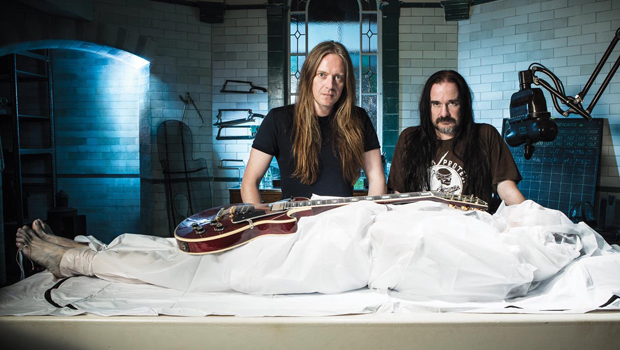Dead Boys: Jeff Walker and Bill Steer Discuss the Gut-Ripping New Carcass Album, 'Surgical Steel'

This is an excerpt from the December 2013 issue of Guitar World. For the rest of this story and more — including Nirvana, Chris Broderick, Cage the Elephant, a fuzz box roundup and John Petrucci's new column — check out the December 2013 issue at the Guitar World Online Store.
They gave up the ghost more than 15 years ago. Now underground metal legends Carcass return from the other side with Surgical Steel, a gut-ripping new album that shows there’s life in those bones yet.
The sky above London is unusually clear and sunny, devoid of the ever-present rain clouds that regularly douse the capital. Joggers are making good use of this stunning August afternoon by running along the tranquil Paddington Branch canal in the northwest corner of the city.
As they pass beneath the Abbey Road bridge that crosses the small canal, the runners stop dead in their tracks at the sight of two longhaired men heaving a large white medical bag—stuffed with a human body and a Les Paul Custom—into the water.
“Can’t say this is the first time we’ve been through this,” Carcass bassist/vocalist Jeff Walker says with a laugh, body bag in hand. The joggers are not as amused. But when you’re extreme metal legends Carcass, provocative concepts and shocked audiences are par for the course.
And for this
Guitar World
photo shoot, Walker and founding Carcass guitarist Bill Steer are happily indulging us by acting out some of the motifs—including primitive surgery, medical mischief and corpse disposal—that have been central to the band’s identity since it first formed in Liverpool in the mid Eighties. The occasion for our shoot and interview is the release of
Surgical Steel
, Carcass’s sixth studio album and their first since they broke up more than 15 years ago.
Rarely do we fly thousands of miles to stage mock murder scenes beneath a bridge. It’s rarer still that we hear a reunion album that sounds as inspiring as
Surgical Steel
. Filled with breakneck blast beats, pummeling dual-guitar rhythms, aggressive blues-infused solos and adventurous arrangements,
Surgical Steel
captures the essence and vitality of the melodic death metal of old-school Carcass. But the record doesn’t just stand out among Carcass’s back catalog—its effortless ability to sound simultaneously classic and progressive ranks it above any death metal release of 2013.
“I was listening to the same records at home that fired me up when I was writing the classic Carcass records,” Steer says of his inspirations. “But then it can’t help but sound modern because it was recorded recently. We have a new drummer and we’re playing a lot tighter than we used to. And there are elements on the record that didn’t appear on any previous albums.
Surgical Steel
is looking ahead and pointing to the future.”
Carcass’s original tenure spanned from 1985 to 1996, a time during which they made a name for themselves as one of underground metal’s most brutal, and innovative, artists. Their body of work included five albums of extreme metal, which progressed in style from grindcore to melodic death metal to stripped-down death ’n’ roll. The classic Carcass lineup of Walker, drummer Ken Owen and Steer (who played guitar on legendary grind act Napalm Death’s first three records) was also a surly bunch of vegetarians that took perverse pleasure in adopting some of the genre’s goriest lyrical and visual themes, a direction inspired early on by Owen’s morbid fascination with his father’s veterinary practice.
Their first two records, 1988’s
Reek of Putrefaction
and 1989’s
Symphonies of Sickness
, are not only required listening for grindcore and death metal aficionados but also straightforward examples of how to offend censorship groups, thanks to cover art that features Walker’s collages of autopsy photos cut from medical journals.
“When we were younger, we leaned toward some arty-farty pretentions,” Walker says with a laugh. “Like, ‘We can justify putting corpses on the sleeves because while you’re complaining about it, at the end of the day you’re probably gonna go back and eat a cow. So you’re fucking full of shit!’ ”
Carcass’s desire to push boundaries didn’t just stop at their album sleeves. Through each successive album, the band members relentlessly challenged the limits of their own playing. By their third album, 1991’s
Necroticism—Descanting the Insalubrious
, Carcass’s vision expanded to accommodate longer, more intricate songs with strong melodic cores. To help in this effort, they recruited a young Swede named Michael Amott—who would eventually go on to find fame with his own band, Arch Enemy—on second lead guitar.
Amott’s contributions to
Necroticism
helped the band realize a more melodic death metal–oriented sound, which they would perfect on their 1993 release,
Heartwork
. That album, now considered an extreme metal classic, was a major influence on the entire metalcore scene of the new millennium.
Photo: Jimmy Hubbard
For the rest of this story and more — including Nirvana, Chris Broderick, Cage the Elephant, a fuzz box roundup and John Petrucci's new column — check out the December 2013 issue at the Guitar World Online Store.

Get The Pick Newsletter
All the latest guitar news, interviews, lessons, reviews, deals and more, direct to your inbox!
Brad is a Brooklyn-based writer, editor and video producer. He is the former content director of Revolver magazine and executive editor of Guitar World. His work has appeared in Vice, Guitar Aficionado, Inked and more. He’s also a die-hard Les Paul player who wishes he never sold his 1987 Marshall Silver Jubilee half stack.

